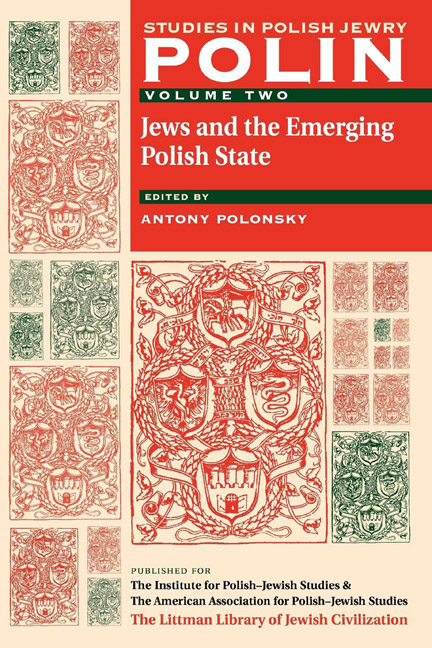Book contents
- Frontmatter
- Dedication
- Editors and Advisers
- Contents
- Polin: Studies in Polish Jewry
- Polin
- Statement From the Editors
- SYMPOSIUM: JEWS AND THE EMERGENCE OF AN INDEPENDENT POLISH STATE
- Lucien Wolf and the Making of Poland: Paris 1919
- The Dmowski-Namier Feud, 1915-1918
- History and Myth: Pinsk, April 1919
- Polish Diplomacy and the American-Jewish Community between the Wars
- Dmowski, Paderewski and American Jews (A Documentary Compilation)
- ARTICLES
- DOCUMENTS
- COMMENTARY
- REVIEW ESSAYS
- BOOK REVIEWS
- Leiter to the Editors
- Contributors
- Obituaries
The Dmowski-Namier Feud, 1915-1918
from SYMPOSIUM: JEWS AND THE EMERGENCE OF AN INDEPENDENT POLISH STATE
- Frontmatter
- Dedication
- Editors and Advisers
- Contents
- Polin: Studies in Polish Jewry
- Polin
- Statement From the Editors
- SYMPOSIUM: JEWS AND THE EMERGENCE OF AN INDEPENDENT POLISH STATE
- Lucien Wolf and the Making of Poland: Paris 1919
- The Dmowski-Namier Feud, 1915-1918
- History and Myth: Pinsk, April 1919
- Polish Diplomacy and the American-Jewish Community between the Wars
- Dmowski, Paderewski and American Jews (A Documentary Compilation)
- ARTICLES
- DOCUMENTS
- COMMENTARY
- REVIEW ESSAYS
- BOOK REVIEWS
- Leiter to the Editors
- Contributors
- Obituaries
Summary
Roman Dmowski was the antithesis of Lewis Namier; by conviction, Dmowski was the archetypical anti-semite while Namier was a fervent disciple of Zionism. It was therefore no accident that these two men shared a vigorous dislike for each other. Namier, with characteristic hyperbole wrote that ‘I am not actuated … by any personal resentment against Dmowski and his whole Polish Black Hundred crew.’ In a less subtle manner, Dmowski contemptuously referred to Namier as that ‘little Galician Jew’. During the First World War these two men crossed paths in London where they both became involved with the Polish question and entered into an acrimonious feud centring on their respective visions of a future Poland. From 1916 onwards, they waged a very bitter and very personal struggle to discredit each other's views on the Polish question in the eyes of the British foreign policy establishment. In their duel for influence, each man revealed a startling dichotomy of character reflecting his undoubted qualities of genuine brilliance as well as his unsavoury attributes.
Roman Dmowski was the most important Polish right-wing ideologist of his generation. He began his political career in fin de siècle Warsaw and quickly established himself as the leader of the radical right National Democratic Party (Narodowa Democracja -popularly endecja). His reputation as the voice of the Polish right wing grew after he became editor of the influential journal PTzegląd Wszechpolski (All-Polish Review) in January 1895 and through the publication a number of important political tracts: Myśli nowoczesnego Po/aka (Thoughts of the Modern Pole, 1903) and La Question Polonaise (1906). Dmowski's ideology transcended party political lines with his ideas on the nation forming the intellectual foundation of modem Polish nationalism.
Dmowski could display considerable political acumen, but his efforts were frequently undermined by his prejudices and a proclivity to engage in the politics of the boudoir. Eduard Benes, the future Czech leader, was ‘immediately captivated by his shrewdness and the trenchant character of his political plans’. Benes also observed that Dmowski ‘often exhibited rather ostentatiously his anti-semitism’. Dmowski's record of antipathy towards Polish Jewry included the notorious boycott of Jewish enterprises in Warsaw in 1912.
- Type
- Chapter
- Information
- Jews and the Emerging Polish State (Polin Volume Two) , pp. 37 - 49Publisher: Liverpool University PressPrint publication year: 2008

